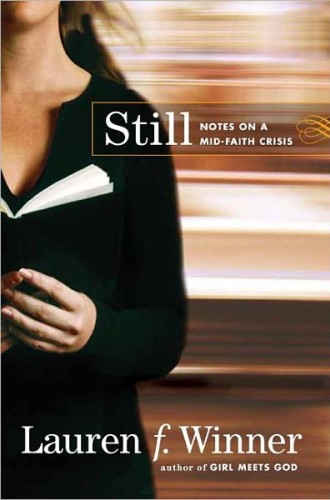Still, by Lauren F. Winner
Lauren Winner first drew widespread literary attention in 2004 with the spritely spiritual memoir Girl Meets God: A Memoir, which told the story of her conversion first to Orthodox Judaism and then to a Christianity of a Jesus-loving-Anglican-intellectual-evangelical kind. That book, with its fun and its chatty tone, snuck up on me like a charming guest at a cocktail party. I began the interaction thinking she was just engaging in interesting spiritual small talk and only later suddenly realized that we were talking about real things of profound depth.
But there is no getting around the fact that Girl Meets God was written by a young woman in her twenties. And it should come as no surprise that the precocious Winner would have her religious midlife crisis early as well.
After Girl Meets God, Winner wrote other important books. One of the more talked-about ones, Real Sex: The Naked Truth about Chastity, concludes with the end of her newfound celibacy as she enters a happy new marriage. Since then, Winner has graduated from Duke Divinity School, signed on there as a professor and become well known around the world as an expert on Christian spirituality. She has also divorced.
Read our latest issue or browse back issues.
In the wake of her divorce and the death of her mother, the book Still was born. It is an account of another remarkable year in her life, this one long after her conversion.
Many memoirs written about experiences that are very recent display the excesses of material that has not had time to simmer. Winner avoids this trap by naming the bitterness and the pitfalls early on, in small ways and on her own terms: “During my marriage, God became an abstraction. God became like math, puzzling and far away. For several years, my mantra was I will stay in this marriage because I am a Christian and Christians stay.”
Her other strategy seems to have been to drift to the porch on Sunday mornings and read the New York Times instead of going to church. In that she was egged on by the “few, jagged mean things good Christian people said to me, things I shouldn’t hold on to but I do, like when a friend into whose lap I poured all my misery said, Well you know Lauren if you leave your husband, you are leaving Jesus.”
She does go on to list a few more things that will infuriate the reader on her behalf, examples of punishment and judgment that she claims she doesn’t want to hold on to but is laying out in print for the world to see. Then, as if catching herself in the act, she suddenly confesses, “Silly and immature of me to hold on to them (it is only my own palms they are slicing), but I do because these jagged things afford me the only self-righteousness I have in this whole tedious story.” And here I breathed a sigh of relief, confident that I was in a skilled and introspective memoirist’s good hands, and not on someone’s rabbit wheel of unprocessed rancor and regret.
Still is decidedly not a divorce memoir. Goodness knows, the world does not need more of those. In fact, Winner plays with the saccharine shadow cast by the ubiquitous best seller Eat, Pray, Love, which she whimsically retitles Masticate, Meditate, Masturbate. “I read the memoir,” she explains, “but after leaving my husband, I didn’t go on a trip around the world; I just moved off the porch and went, again, to church.”
This book is primarily a spiritual memoir, and a serious one at that, to which the personal twists and turns of Winner’s life form a misty backdrop. Still is about what happens to Winner’s spirit long after the thrill of conversion, after the hard decisions of life and in the aftermath of divorce.
Winner’s feelings of guilt around her divorce, which she calls “a grave, costly failure,” runs throughout the book’s account of the year, although she never gives us the exact reasons for it, which leaves the reader to wonder. Are there really that many Christians today who would condemn a woman for getting a divorce? Didn’t Ronald Reagan take care of that for evangelicals? Or was that just for evangelical men? Are the stakes different when one has written a book about chastity that concludes with a marriage? Are the stakes different for one who straddles the evangelical and mainline lecture circuits? Are the stakes different when one can find no serious fault with the husband being left behind? Are the stakes different in the fresh and tender months after the break up of the marriage?
Winner does not seek to satisfy the reader’s curiosity about questions like these. The journey of her soul is the bigger story she has in mind. Careful to compliment her ex-husband and to creatively criticize herself, Winner seems more guarded than ever in how she writes about her personal life. Friends appear in Still as first names only, and usually in highly complimentary terms, offering a bit of sage advice or expressing well-timed compassion. With a mature writer’s restraint, Winner hints only at what we absolutely need to know about her personal life in order to follow the journey of her spirit.
However guarded Winner is in her descriptions of others, she is remarkably transparent about her relationship with God. She refuses to be the guru with the easy answers to make your life better. There is no tidy ending to this narrative, no clever wrap-up of lessons learned and filed away. This is a work in progress. “I have heard that many of us sojourn in the middle for a long, long time; that we have many middles,” she says. “I have heard that some people eventually leave the middle and arrive at an end. . . . I expect it takes a long time to get there.”
Winner takes us bravely into moments of her unbelief, her bouts with guilt and her wrestling matches with ambition, and she delivers this heartbreakingly funny description of paralyzing anxiety:
In the middle of class one day, I am seized by the thought that I left my stove on that morning, making tea, making oatmeal, and that the house has by now long since burned down, and the fire department didn’t know how to reach me, and I will come back to black hulks of char. In class we are discussing Richard Hooker’s theology of the Eucharist, his claim that you can no more give an unbaptized person the Eucharist than you can feed a corpse.
From there, Winner bolts out of the classroom and finds herself obsessively reciting the Psalms to herself in Duke Gardens: “There, crouched by the lily pond like a soccer ball, I know I look crazy, but the panic about my stove feels very real. I know I look like a desperate crazy lady talking to herself, rocking back and forth; but maybe this is just how demons attack.” She remains there, reciting the Psalms, determined “that I will stay by the pond for as many minutes, hours, as it takes, that I will not race home to behold my standing-up house, my not-on-fire kitchen, my half-eaten bowl of oatmeal resting calmly in the sink.”
This is the genius of Winner’s writing. She starts with an ordinary experience most people have had, an ordinary question like “Did I leave the burner on?” From there she takes us to eucharistic theology and the Psalms, and we go with her willingly, trusting her because she, like us, has wondered if her house is burning down.
Remarkably, she makes us learn and laugh in the midst of it. We learn because Winner is one of those gifted teachers who slips in some wisdom along with the sweet stuff on the spoon. We take our medicine from the ancients, the Christian mystics and the scriptures while tasting the sweetness of her narrative. We laugh, like the Bible’s Sarah laughed, because we know our narrator is not alone. God is there. God is still there.
And now we come to the most beautifully drawn character in the book. No, it is not God. Winner has moved on from earlier writings about the thrilling presence of Jesus to a braver and rawer description of God’s absence. These absences are so bleakly and forthrightly portrayed in the sad early chapters that when God does appear as the year unfolds, the appearance is unexpected particularly because it happens in the ordinary and sometimes hilariously described life of the local church.
In a remarkable twist in an increasingly predictable genre, the most lovingly drawn and nuanced character in Still is the church. This most unlikely hero is a body of believers who watch videos in the parish hall during a pie social, who miss the entire point of the adult education program they are meant to be discussing, and who miraculously reveal to Winner the presence of God when she is most desperate for it. “I do not think I am a saint,” she says, “but I am beginning to learn that I am a small character in a story that is always fundamentally about God.”
During a surprise house blessing with a friend who pulls Bibles and cookies out of nowhere, God appears. While Winner is serving communion to a man who has a wasting disease and can only take in Ensure and lemonade, God appears and slakes her thirst. Even in the rituals of the oft-maligned Altar Guild, God appears as Winner soaks up the Holy Spirit in a candlelit sanctuary the guild has lovingly decorated.
But God also appears in the mighty cloud of witnesses that was once, and still is, the church. Emily Dickinson, John Updike and Julian of Norwich make their way into Winner’s journey. The master teacher consistently places herself within a tradition larger than she is and makes us want to do the same. In reading her memoir, we ride on the shoulders of one who is learning, and in the journey we find that we have been taught. Because our learning narrator is also a skilled teacher, we long to know more about those who have taught her—those who wrote great books and those who discuss them over homemade pie in an old parish hall.
As Winner nears the end of her hard year, we cling to her progress as if it were our own. We are knit together with her journey as she has been knit together with a healing larger than herself. “In the clearing,” she says toward the end, “I can begin to see those people and stories and words that held me to something resembling the Christian faith; that hold me still, if often with a loose stitch.”
In an age when it is much easier to make fun of the church than to love it, to diagnose it than to embrace it, to dismiss it than to reckon with it, Winner has made the church a main character so honestly drawn that we recognize it, so tenderly drawn that we treasure it and so accurately drawn that we laugh in amazement that God can work with it. Still.







